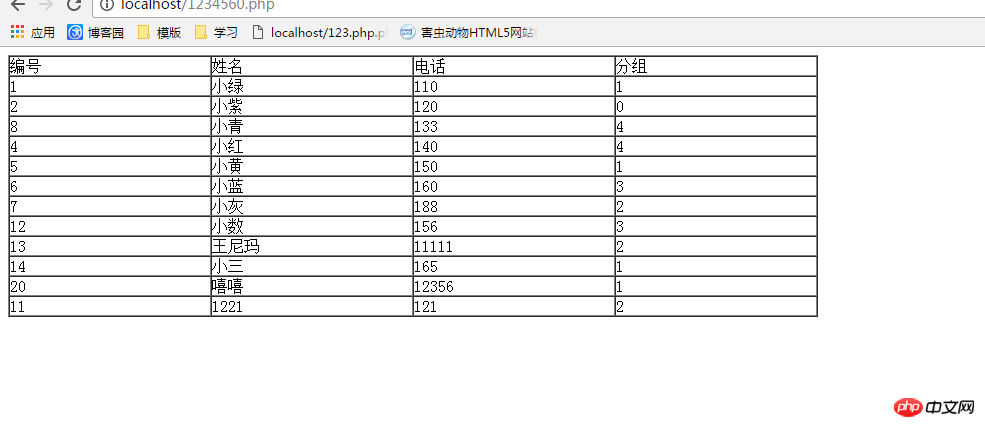 Backend Development
Backend Development
 PHP Tutorial
PHP Tutorial
 How to implement conditional query in php+mysql? (code example)
How to implement conditional query in php+mysql? (code example)
How to implement conditional query in php+mysql? (code example)
How to implement multi-conditions in SQL query fields: first connect to the database; then use SQl's "select from...WHERE...." statement to perform single-condition and multi-condition queries on the database.

What this article shares with you is the code and examples of using php+mysql to implement single-condition and multi-condition queries. It is very practical. Friends in need can refer to it. Recommended
related mysql video tutorials: "mysql tutorial"
Single condition query:
1. First there must be a A table showing the data in the table:
<!DOCTYPE html PUBLIC "-//W3C//DTD XHTML 1.0 Transitional//EN" "http://www.w3.org/TR/xhtml1/DTD/xhtml1-transitional.dtd">
<html xmlns="http://www.w3.org/1999/xhtml">
<head>
<meta http-equiv="Content-Type" content="text/html; charset=utf-8" />
<title>无标题文档</title>
</head>
<body>
<table border="1" cellspacing="0" cellpadding="0">
<tr>
<td width="200">编号</td>
<td width="200">姓名</td>
<td width="200">电话</td>
<td width="200" >分组</td>
</tr>
<?php
$db = new mysqli("localhost","root","12345678","heiheihei");
$sql = "select * from contacts";
$r = $db->query($sql);
//传值
while ($attr = $r->fetch_row())
{
echo " <tr>
<td>{$attr[0]}</td>
<td>{$attr[1]}</td>
<td>{$attr[2]}</td>
<td>{$attr[3]}</td>
</tr>";
}
?>
</table>
</body>
</html>Above picture:

A table without any changes
2 .Let the user enter another from form and click to query:
<form action="shouye.php" method="post">
<p>
输入名字:<input type="text" name="name"/>
<input type="submit" value="查询"/>
</p>
</form>As shown in the picture:

3. Create a keyword query:
<?php
//实现两个逻辑
//1.如果没有post数据.查所有的
//2.如果有post数据.根据条件查
$db = new mysqli("localhost","root","12345678","heiheihei");
//连接数据库
$tj = " 1 = 1 ";
$name="";
//恒成立,如果没有写数据,那就让条件等于1=1,这个条件是查找所有的数据
//如果你写入数据,按照数据查
if(!empty($_POST))
{
$name = $_POST['name'];
$tj = " name like '%{$name}%'";
}
//将条件拼接到SQl语句
$sql = "select * from contacts WHERE {$tj}";
echo $sql;
//查出来
$r = $db->query($sql);
//传值
if($r)
//开始判断
{
//$attr已经接收到了值,现在只需要获取他的索引就行了
while ($attr = $r->fetch_row())
{
//关键字特殊查询
$str = str_replace($name,"<mark>{$name}</mark>",$attr[1]); //查找替换如ctrl+f
//substr_replace(); 在指定位置替换
//substr(); 截取字符串
$gname = "select gname from groups WHERE gid='{$attr[3]}'";
//分组表中的gid,和我点击的
$nresult = $db->query($gname);
$gname = $nresult->fetch_row();
$nation = $gname[0];
echo " <tr>
<td>{$attr[0]}</td>
<td>{$str}</td>
<td>{$attr[2]}</td>
<td>{$nation}</td>
?>Picture:

Multi-condition query:
The same as before;
The php statement:
<?php
//实现两个逻辑
//1.如果没有post数据.查所有的
//2.如果有post数据.根据条件查
$db = new mysqli("localhost","root","12345678","heiheihei");
//连接数据库
$tj1 = " 1 = 1 ";
$tj2 = " 1 = 1 ";//两个条件的恒等
$name="";
//恒成立,如果没有写数据,那就让条件等于1=1,这个条件是查找所有的数据
//如果你写入数据,按照数据查
if(!empty($_POST["name"])) //第一个条件的判断(用到了模糊查询)
{
$name = $_POST['name'];
$tj1 = " name like '%{$name}%'";
}
if(!empty($_POST["tel"]))
{
$tel = $_POST["tel"];
$tj2 = "tel = '$tel'";
}
//将条件拼接到SQl语句
$sql = "select * from contacts WHERE {$tj1} AND {$tj2}";Rendering:

This way: if there are several conditions, make several condition variables. If the first condition is not empty, the first condition will be executed, and the second condition will be executed. The second condition is executed if the condition is not empty. If both are empty, all data is searched
The above is the detailed content of How to implement conditional query in php+mysql? (code example). For more information, please follow other related articles on the PHP Chinese website!

Hot AI Tools

Undresser.AI Undress
AI-powered app for creating realistic nude photos

AI Clothes Remover
Online AI tool for removing clothes from photos.

Undress AI Tool
Undress images for free

Clothoff.io
AI clothes remover

Video Face Swap
Swap faces in any video effortlessly with our completely free AI face swap tool!

Hot Article

Hot Tools

Notepad++7.3.1
Easy-to-use and free code editor

SublimeText3 Chinese version
Chinese version, very easy to use

Zend Studio 13.0.1
Powerful PHP integrated development environment

Dreamweaver CS6
Visual web development tools

SublimeText3 Mac version
God-level code editing software (SublimeText3)

Hot Topics
 PHP's Purpose: Building Dynamic Websites
Apr 15, 2025 am 12:18 AM
PHP's Purpose: Building Dynamic Websites
Apr 15, 2025 am 12:18 AM
PHP is used to build dynamic websites, and its core functions include: 1. Generate dynamic content and generate web pages in real time by connecting with the database; 2. Process user interaction and form submissions, verify inputs and respond to operations; 3. Manage sessions and user authentication to provide a personalized experience; 4. Optimize performance and follow best practices to improve website efficiency and security.
 PHP and Python: Different Paradigms Explained
Apr 18, 2025 am 12:26 AM
PHP and Python: Different Paradigms Explained
Apr 18, 2025 am 12:26 AM
PHP is mainly procedural programming, but also supports object-oriented programming (OOP); Python supports a variety of paradigms, including OOP, functional and procedural programming. PHP is suitable for web development, and Python is suitable for a variety of applications such as data analysis and machine learning.
 PHP and Python: Code Examples and Comparison
Apr 15, 2025 am 12:07 AM
PHP and Python: Code Examples and Comparison
Apr 15, 2025 am 12:07 AM
PHP and Python have their own advantages and disadvantages, and the choice depends on project needs and personal preferences. 1.PHP is suitable for rapid development and maintenance of large-scale web applications. 2. Python dominates the field of data science and machine learning.
 Choosing Between PHP and Python: A Guide
Apr 18, 2025 am 12:24 AM
Choosing Between PHP and Python: A Guide
Apr 18, 2025 am 12:24 AM
PHP is suitable for web development and rapid prototyping, and Python is suitable for data science and machine learning. 1.PHP is used for dynamic web development, with simple syntax and suitable for rapid development. 2. Python has concise syntax, is suitable for multiple fields, and has a strong library ecosystem.
 PHP: Handling Databases and Server-Side Logic
Apr 15, 2025 am 12:15 AM
PHP: Handling Databases and Server-Side Logic
Apr 15, 2025 am 12:15 AM
PHP uses MySQLi and PDO extensions to interact in database operations and server-side logic processing, and processes server-side logic through functions such as session management. 1) Use MySQLi or PDO to connect to the database and execute SQL queries. 2) Handle HTTP requests and user status through session management and other functions. 3) Use transactions to ensure the atomicity of database operations. 4) Prevent SQL injection, use exception handling and closing connections for debugging. 5) Optimize performance through indexing and cache, write highly readable code and perform error handling.
 Why Use PHP? Advantages and Benefits Explained
Apr 16, 2025 am 12:16 AM
Why Use PHP? Advantages and Benefits Explained
Apr 16, 2025 am 12:16 AM
The core benefits of PHP include ease of learning, strong web development support, rich libraries and frameworks, high performance and scalability, cross-platform compatibility, and cost-effectiveness. 1) Easy to learn and use, suitable for beginners; 2) Good integration with web servers and supports multiple databases; 3) Have powerful frameworks such as Laravel; 4) High performance can be achieved through optimization; 5) Support multiple operating systems; 6) Open source to reduce development costs.
 How to start mysql by docker
Apr 15, 2025 pm 12:09 PM
How to start mysql by docker
Apr 15, 2025 pm 12:09 PM
The process of starting MySQL in Docker consists of the following steps: Pull the MySQL image to create and start the container, set the root user password, and map the port verification connection Create the database and the user grants all permissions to the database
 MySQL's Role: Databases in Web Applications
Apr 17, 2025 am 12:23 AM
MySQL's Role: Databases in Web Applications
Apr 17, 2025 am 12:23 AM
The main role of MySQL in web applications is to store and manage data. 1.MySQL efficiently processes user information, product catalogs, transaction records and other data. 2. Through SQL query, developers can extract information from the database to generate dynamic content. 3.MySQL works based on the client-server model to ensure acceptable query speed.





